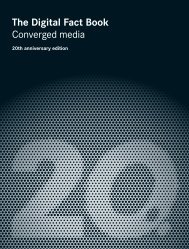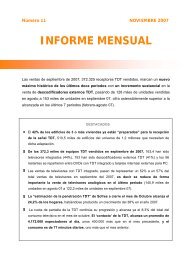The Price of Plurality - Stakeholders - Ofcom
The Price of Plurality - Stakeholders - Ofcom
The Price of Plurality - Stakeholders - Ofcom
You also want an ePaper? Increase the reach of your titles
YUMPU automatically turns print PDFs into web optimized ePapers that Google loves.
1 <strong>The</strong> Purpose <strong>of</strong> <strong>Plurality</strong>15• if Channel 4’s cross-subsidy model broke down and it eithertook a share <strong>of</strong> the BBC’s public funding or was privatised?• if the BBC alone made children’s programmes?Alternatively, it may be more productive to ask the question not fromthe perspective <strong>of</strong> the producers but from the consumer and citizen.What would they judge to be the impact on their future lives:• if television no longer provided salient popular culturalreference points, shared moments to talk about?• if there were no longer programmes that attracted asviewers a range <strong>of</strong> people, <strong>of</strong> different social and culturalbackgrounds, who would never otherwise interact?• if there was a diminution <strong>of</strong> trust in the news andinformation on which they based decisions in their lives,individually and collectively?• if people living in the Nations <strong>of</strong> Britain and the regions <strong>of</strong>England believed that they were not adequately served withinformation and news about their lives that impacted directlyon where they lived, close to home?• if one’s children no longer watched programmes locatedin the landscape and neighbourhoods they see about themas they grow up, but only the youth culture <strong>of</strong> the UnitedStates?• if there were, to use an unfashionable phrase, a loss <strong>of</strong>cultural patronage ; no longer leaps <strong>of</strong> editorial faith thatin the past have fostered new talent, new writers, newcomedians, new actors, new presenters <strong>of</strong> history, science anddocumentaries, regardless <strong>of</strong> the risk <strong>of</strong> commercial return?More radically, what would Britain feel like:• if, at a time <strong>of</strong> political decision – a General Election forexample – in a fragmented, multicultural, multilingual society,reliant for its information on an indiscriminate plurality <strong>of</strong>discrete online sources, there was no longer a common publicservice meeting point where the political agenda, the points<strong>of</strong> decision, could be focused?• if there were not an alternative publicly motivated,non-conformist counter-culture challenging authorisedconventional wisdom?One question lies at the heart <strong>of</strong> all these. In the converged world<strong>of</strong> the internet, does one believe that television broadcasting will stillsomehow represent something ‘special’? Will there still be the will tolay out broadcasters’ public purposes as past Acts <strong>of</strong> Parliament havedone, investing television with an air <strong>of</strong> civic importance that makesit still intrinsically different in expectation to the wealth <strong>of</strong> informationon the internet? In the years <strong>of</strong> digital switchover, we will encounter arapidly advancing internet future but a long-living television past. <strong>The</strong>judgement that policy-makers must make is in essence to understandhow to the balance the two and ensure the continuities betweenthem. PSB has always been strong on principles, but its effectivenessdepends on deciding upon a series <strong>of</strong> diffi cult trade-<strong>of</strong>fs.







